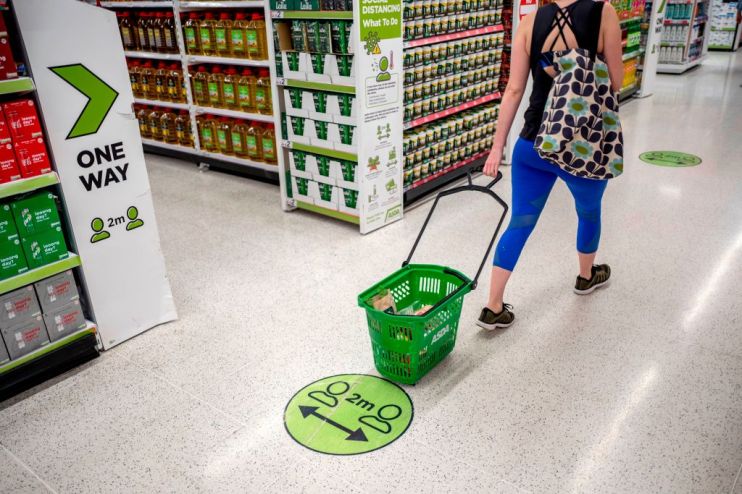Supermarket visits fall on coronavirus face mask rules

British shoppers paid fewer visits to supermarkets in the wake of new rules making face masks mandatory, new data has revealed.
The number of visits to UK supermarkets was 2m lower than expected in the week after the rule was adopted, according to Kantar.
Charlotte Scott, Kantar’s consumer insight director, said the decline showed people may need time to adjust to the new regulations as they now had to plan ahead for every shopping trip.
It came as supermarket sales growth slowed as shopping habits began to return to normality after the easing of coronavirus lockdown measures.
Grocery sales grew 14.4 per cent in the 12 weeks to 9 August, down slightly on the previous month.
Shoppers go online as lockdown eases
The figures show the supermarket sector is beginning to see a return to normality after a surge in sales at the height of the lockdown.
Grocery sales stood at £9.7bn over the past four weeks — the lowest sum since February, but still considerably higher than pre-pandemic levels.
Online grocery sales continued their heady rise and reached a record market share of 13.5 per cent over the period.
Ocado has been the major beneficiary of the shift to internet purchases, growing its market share 45.5 per cent over the past 12 weeks.
It came alongside separate data showing that supermarket sales growth was driven almost entirely by online shopping.
Brits spent £678m more in supermarkets in the four weeks to 8 August than in the same period last year, according to Nielsen, with online sales accounting for 97 per cent of this growth.
“It is evident that some new shopping habits that developed as a result of the pandemic — such as opting to shop online — continue,” said Mike Watkins, Nielsen’s UK head of retailer and business insight.
“UK shoppers are now establishing a new, regular shopping routine and we can expect the current levels of growth to continue for the rest of the summer
The slowdown in supermarket shopping means average spend has fallen below £25 for the first time since March. However, at £24 it is still well above the pre-pandemic average of £19.
“While things are far from normal, the data shows a gradual softening of the more extreme lockdown trends in the grocery market,” said Scott.
“The relaxing of rules across much of the country means shoppers are less inclined to stock up their cupboards with regular large trips.”
Brits eat out as recession hits
The latest figures include the first week of the government’s Eat Out to Help Out scheme, which offers discounts at participating restaurants on Mondays, Tuesdays and Wednesdays in August.
Early indications show the scheme has succeeded in giving the hospitality industry a much-needed boost after months of closure.
Over the past fortnight footfall at restaurants, cafes and bars has risen significantly at the beginning of the week, according to Kantar.
This is likely to have an impact on grocery sales as Brits opt to eat out instead of cooking at home.
But the exclusion of alcohol from the scheme will make booze a resilient category for supermarkets, and take-home alcohol sales grew 28.3 per cent over the last fortnight.
The figures also come a week after the UK officially entered a recession, though the impact has not yet been felt in grocery sales.
“During a recession we would generally expect shoppers to manage their spend more carefully,” said Kantar’s Scott.
“Early evidence suggests that most are not yet choosing to trade down, with brands and premium own label lines currently performing well, however price cuts have increased compared with July as some people look for opportunities to save.”
Morrisons bags market share boost
Morrisons was the major winner among the big four retailers, enjoying the largest increase in market share over the 12-week period.
The supermarket grew sales by 16 per cent, meaning it now accounts for 10.2 per cent of the market.
Tesco was close behind in terms of sales growth, but lost 0.4 percentage points in market share. Sainsbury’s and Asda also saw their market share slip.
Iceland was the second fastest growing retailer, with sales up 29.2 per cent, while Co-op increased its share to 7.1 per cent.
Lidl held its share steady at 5.9 per cent, while Aldi and Waitrose both lost 0.2 percentage points.
| Total Till Roll – GB Consumer Spend | 12 weeks to 11 August 2019 | Share | 12 weeks to 09 August 2020 | Share | Change |
|---|---|---|---|---|---|
| £m | % | £m | % | % | |
| Total Grocers | 26,897 | 100.0% | 30,772 | 100.0% | 14.4% |
| Total Multiples | 26,438 | 98.3% | 30,104 | 97.8% | 13.9% |
| Tesco | 7,253 | 27.0% | 8,178 | 26.6% | 12.8% |
| Sainsbury’s | 4,146 | 15.4% | 4,599 | 14.9% | 10.9% |
| Asda | 4,019 | 14.9% | 4,402 | 14.3% | 9.5% |
| Morrisons | 2,708 | 10.1% | 3,142 | 10.2% | 16.0% |
| Aldi | 2,168 | 8.1% | 2,444 | 7.9% | 12.7% |
| Co-op | 1,776 | 6.6% | 2,175 | 7.1% | 22.4% |
| Lidl | 1,579 | 5.9% | 1,827 | 5.9% | 15.7% |
| Waitrose | 1,324 | 4.9% | 1,453 | 4.7% | 9.7% |
| Iceland | 581 | 2.2% | 751 | 2.4% | 29.2% |
| Ocado | 373 | 1.4% | 542 | 1.8% | 45.5% |
| Other Multiples | 509 | 1.9% | 590 | 1.9% | 15.9% |
| Symbols & Independents | 460 | 1.7% | 668 | 2.2% | 45.4% |